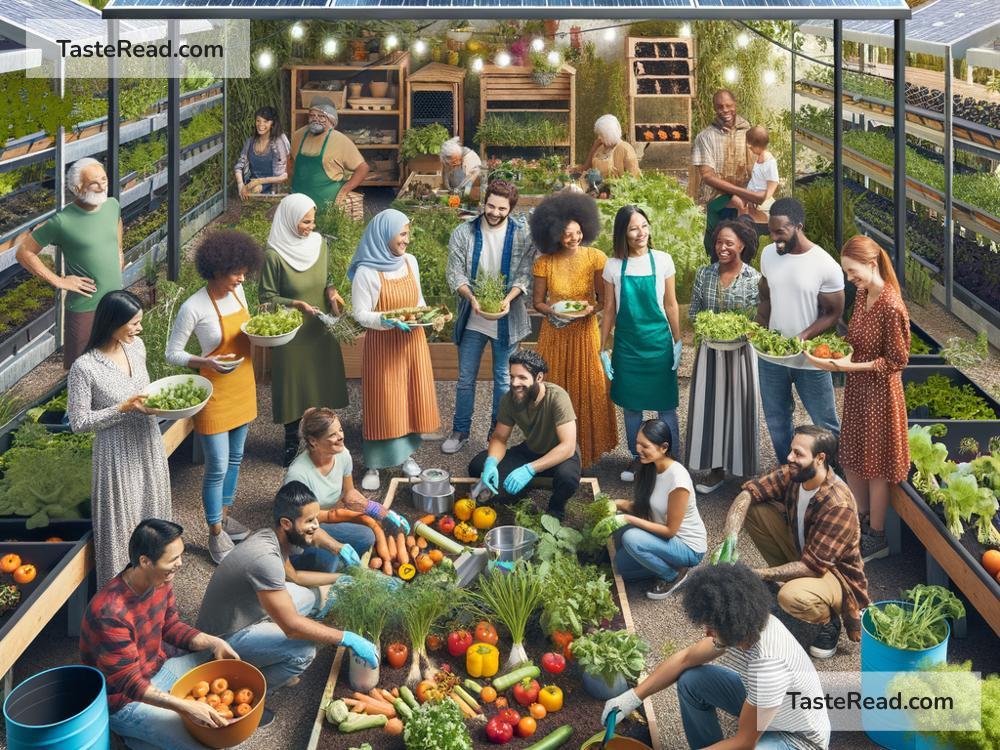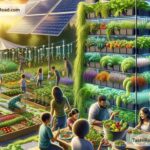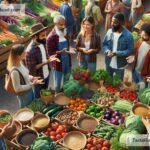The Future of Food and Sustainable Community Practices
As the world continues to grow, feeding billions of people becomes more challenging. Climate change, population growth, and the strain on natural resources mean we need to rethink how we produce, deliver, and consume food. The future of food is about more than just solving hunger; it’s about creating sustainable systems that protect our planet and support healthy communities. In this blog, we’ll explore the future of food and how communities can adopt sustainable practices to make a difference.
What Is the Future of Food?
The future of food revolves around innovation and sustainability. While traditional farming and food production have served us well for generations, these methods often use resources in ways that aren’t always efficient or eco-friendly. For example, traditional farming uses large amounts of water, land, and harmful chemicals that can pollute the environment.
New ideas and technologies are paving the way for change. Researchers, farmers, and companies are working together to find smarter ways to produce food that require fewer resources and cause less harm to the earth. Some of these advancements include:
-
Alternative Proteins
One major focus is creating eco-friendly options to replace traditional meat, which uses significant resources and contributes to greenhouse gas emissions. Plant-based meats and lab-grown meats are emerging as solutions. These options offer protein-rich foods but with a much smaller environmental footprint. -
Vertical Farming
Instead of growing crops on large pieces of land, vertical farming involves stacking crops in controlled indoor environments. This allows food to be grown year-round using less water and fewer chemicals. It also makes farming possible in cities where land is scarce. -
Smart Farming Technologies
Drones, sensors, and AI are helping farmers monitor their fields more effectively, reducing waste and improving yields. Precision agriculture allows farmers to give plants exactly what they need, minimizing water use and over-fertilization. -
Food Waste Reduction
Around one-third of the food produced worldwide gets wasted. Innovative solutions like upcycling food scraps into new products, improving storage methods, and creating apps to redistribute excess food are helping tackle this issue.
The Role of Sustainable Community Practices
While technology can help produce food more efficiently, communities play a massive role in shaping the future of food. Sustainability isn’t just about what happens on farms or in factories—it’s also about what happens in our neighborhoods, homes, and local markets. Sustainable community practices focus on working together to reduce waste, protect resources, and make healthy food accessible to everyone.
Here are a few ways communities are making a difference and how we can all get involved:
-
Community Gardens
Community gardens bring neighbors together to grow fruits, vegetables, and herbs. These gardens promote local food production, reduce carbon emissions from transporting food, and help people connect with nature. Plus, they make fresh, healthy food accessible to those who may not afford it otherwise. -
Local Farmers’ Markets
Buying food from local farmers’ markets supports small-scale farmers and reduces the environmental impact of transporting food long distances. Locally grown food is often fresher and more nutritious, and buying it helps create strong, resilient communities. -
Composting
Food scraps don’t belong in the trash! Composting allows organic waste to be turned into nutrient-rich soil that can help grow more food. Communities that promote composting reduce landfill waste and create a cleaner environment. -
Teaching Sustainable Habits
Teaching people how to grow their own food, cook healthy meals, and reduce waste can make a big difference. Schools, community centers, and organizations can run workshops to inspire sustainable habits in families and individuals. -
Food Sharing Programs
Food sharing programs are popping up around the world to help fight hunger and reduce waste. Whether it’s donating food to people in need or setting up public fridges where anyone can grab surplus food, these programs create a sense of generosity and sustainability.
Why Does This Matter?
The way we produce and consume food has a direct impact on our planet. Traditional methods of agriculture and food waste contribute to deforestation, climate change, water shortages, and pollution. If we don’t act now, these problems will worsen, leading to food insecurity for millions of people.
But the future of food isn’t just about survival—it’s about creating a world where everyone has access to fresh, nutritious, and affordable meals while protecting the planet for future generations. By adopting sustainable practices at every level—from advanced technology to everyday community actions—we can achieve this goal.
What Can You Do?
Every person can take small steps to contribute to a sustainable future for food. Here are a few ideas:
- Eat Local and Seasonal: Eating what’s grown near you and in season reduces the environmental impact of transportation and storage.
- Reduce Food Waste: Plan meals, store food properly, and use leftovers creatively.
- Support Sustainable Brands: Buy from companies that focus on eco-friendly farming and production.
- Grow Your Own Food: Even a small herb garden on a windowsill can make a difference.
- Educate Yourself and Others: Share ideas and learn more about sustainability.
Conclusion
The future of food depends on innovation, community effort, and individual choices. By embracing new technologies and practices, we can ensure that everyone has access to healthy food while reducing harm to the planet. Communities that work together, grow together—and sustainable food systems are no different.
So let’s start small. Plant a seed, shop local, and share a meal. Together, we can shape a future where food nourishes both people and the planet. The journey toward sustainability begins with us. Let’s take the first step today.


